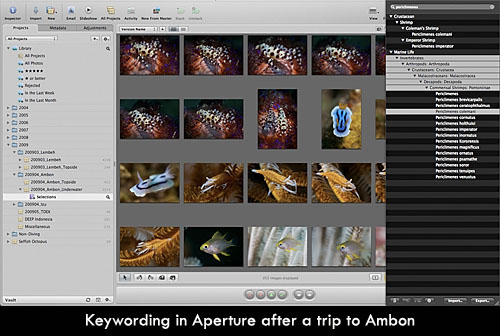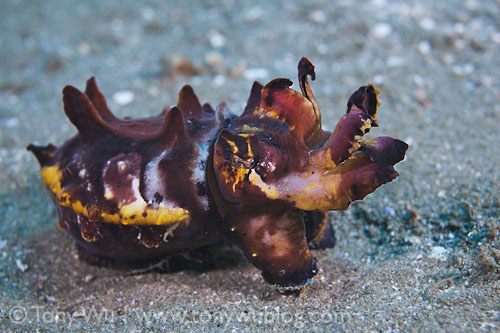Keywording is a necessary, but pain-in-the-rear, task. If you don't know what keywording is, you need to.
By way of background...one of the biggest challenges that comes with digital photography is keeping track of and organising your files. With digital media and storage being so readily available and inexpensive, most people with digital cameras take lots and lots of photos...a lot more than they would have with film.
For argument's sake, let's say you take three big dive trips a year, during which you take 3,000 photos. Add to that several thousand photographs of friends, family and such, and by the end of a typical 12-month period, you literally have thousands of images.
At some point after several years, say you want to find one specific photo...a particularly stunning image of a lionfish that you want to enter into a photo contest.
How do you find it?
Even assuming that you've kept all your images in some reasonably organised format (a big assumption!), you'd still need to look through thousands of photos...a time-consuming, painstaking process...and you and/ or your computer might give up before you find the correct image.
Fortunately, there is a solution for this common dilemma...keywording.
So how does this apply to you?
First of all, if you're not already doing so, you should use either Lightroom or Aperture.
Both of these software packages give you the ability to preview your images quickly (really important given ever-increasing file sizes), edit/ modify them to some degree, and more importantly...keep them organised.
Think of them like the card catalogue at the library. If you're looking for a specific book or books about a particular topic, you look for "key words" in the card catalogue.
Books about underwater photography, for instance, might be listed under "marine", "photography", "underwater photography", "colossal waste of time and money", and so forth.
The card catalogue acts as an index of such key words, allowing you to sort through thousands, sometimes millions, of titles to narrow down your choices to those most relevant to your objective.
Or...a more contemporary idiom might be using a search engine. If you look for underwater photography books using Google, the same concept applies. You'd enter key words like the ones above, and Google would hopefully return useful results...from the billions of web pages Google has indexed.
Bottom line...key words help you make sense of an overabundance of information.
Similarly, in Lightroom and Aperture, if you apply key words to your images, then later, it'll be a lot easier to find specific photos.
The actual process of keywording in these software packages isn't difficult. Just click on the metadata section and type in your key words. Later, you can use the search fields to find your photo.
For instance, with the example above, if I've keyworded properly, all I'd need to do is type "lionfish" into my search field in Aperture, and all the images I've labeled with the key word "lionfish" will pop up...meaning I don't need to sort through pictures of cardinalfish, anemonefish, my dive buddy's rear end, etc.
Keywording isn't hard by any means, but it can be a royal pain, especially if you dive in Asian waters teeming with marine life. After a single dive, you might need to apply key words for 10, 20, 30 or more species...looking each one up in guide books, and trying to spell each name correctly. Repeat for three dives a day...and you've got no time to enjoy your trip!
There's help available now, at least for marine photographers, in the form of a pre-packaged list of key words for marine life that covers the genus and species of over 4,000 fish, 4,000 invertebrates, and all known marine turtles, rays, skates, sharks, marine reptiles and marine mammals...basically, just about everything you're likely to encounter.

What this means is that once you've identified your subject (No...unfortunately the keyword list cannot ID marine life for you!), you can literally drag-and-drop all the relevant keywords onto your file(s), saving you the time and hassle of typing, and also ensuring consistency.
I use Aperture, and I have my own keywording system that I've developed ("cobbled together" is probably more accurate), so when I was testing a review copy of the keywords, my primary concern was ensuring that the MarineLife Keywords list didn't wipe out my own system.
It didn't.
After importing the MarineLife Keywords into Aperture, I had all of my original key words available to me, as well as the new ones...which means my old filing system is intact, and I can gradually start to integrate the new one.
There's one other feature I really like about the MarineLife Keyword list. One of things that really irritates me is when people capitalise common names of marine life...typing something like: "I saw lots of Lionfish and Giant Frogfish after photographing Spotted Eagle Rays."
Common names should not be capitalised. Period.
The MarineLife Keywords list does not capitalise common names (unless there is a proper name involved) and the genus and species names are properly formatted, with the genus name capitalised and the species name not. Simple formatting issue, but it shows attention to detail and knowledge of proper convention.
If you're wondering what the key words actually look like, let me give you one example. Say I wanted to apply key words to this photo of a flamboyant cuttlefish I took in Ambon.

All I do is type "flamboyant" into the search field in Aperture's key word heads-up display, and the MarineLife Keywords database gives me:
Marine Life, Invertebrates, Mollusks: Mollusca, Cephalopods: Cephalopoda, Cuttlefish: Sepiida, Sepiidae, flamboyant cuttlefish: Metasepia pfefferi
...in other words, everything I'd need to find this photo (and others like it) again later.
Of course, the MarineLife Keywords database isn't meant to anticipate every key word you'll ever need...just the taxonomic ones.
For this photo, for instance, I'd add my own additional key words of: Air Manis, Ambon, Indonesia...to keep track of where I took the photo.
So to wrap up, if you take a lot of photos and need a good filing system...use Aperture or Lightroom, and get the MarineLife Keywords list to make keywording quicker and easier.
You can see more details on the MarineLife Keywords website. The MarineLife Keywords database costs $99, but you can get a $5 discount by using the discount code I692W094 upon checkout.
If you're not already familiar with keywording, be sure to watch the demo video on the site that Eric Cheng put together.